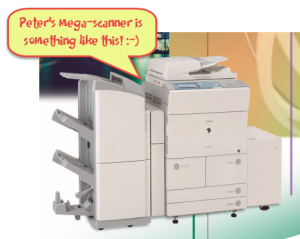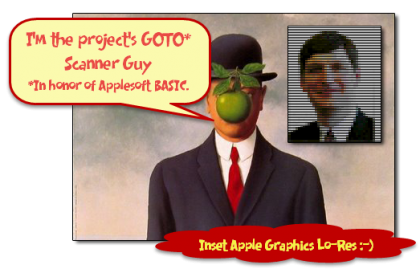We are extremely pleased, almost beyond measure, to welcome Peter Caylor as our newest member of The Softalk Apple Project Advisory Board. In addition to serving as an Adviser, Peter is the "Heavylifting Champion" of the newly formed Scanning & Preservation SIG (Special Interest Group).
"While the STAP project was in its early days," said Jim Salmons, project Research Director, "Peter stepped up and volunteered to contribute his incredible personal collection of high-resolution, OCRed PDF scans of nearly all the Softalk magazines! Not only that, he described this mega-to-die-for ultra-awesome large-format flatbed scanner with large-capacity sheet feeder. It was truly amazing what he was offering to the project."

"I am happy to assist anywhere I can add value to the project." Peter said in a recent email exchange, adding, "I'm happy to serve..." before going on to tick off the various awesome tasks he was working on to coordinate our bulk scanning activity. In short, what was expected to be a large, time-consuming critical first step is now immensely doable. With Peter stepping up such an incredible offer, we immediately agree to launch the Scanning & Preservation SIG and to undertake our activities under its auspices. Here's what we're up to...
A significant proportion of the reference scanning is already in the can. Our next steps include Peter extracting lossless 600dpi TIFF files from existing lossless 600dpi PDFs to create our per-page reference image files. Jim is coming up with a way to extract the text layer from Peter's PDFs (harder than it ought to be, thank you Adobe) and get it into a data store that will be efficient for FactMiners gameplay.
The Scanning & Preservation SIG is targeting specific issues for rescanning, particularly where the current facing-page scans of the late-run, thick, perfect-bound issues are affected. In the case where the STAP archive has multiple copies of an issue, we will sacrifice one to 'deconstruction' for scanning purposes on Peter's awesome scanner. And finally, there are a few issues that Peter is missing which we are attempting to correct by giving him copies from the extras of the STAP collection, or providing missing issues for him to scan to add to his own and the STAP collections.
So, yes, this announcement is particularly exciting. Not only are we pleased and proud to add Peter to the Advisory Board, but his "Let's do it!" attitude is highly energizing and is a real indication that we're turning the corner on the STAP project becoming a sustainable community-based grassroots project.
Thank you Peter for the immense contribution that you are making to The Softalk Apple Project.

Comments
Very exciting indeed!
This is very exciting news to me, as well--I've done a fair amount of magazine scanning over the last decade, though I'm sure nothing like the scale of Peter's work, and only recently at that sort of resolution. If he has a blog about his efforts, or will post here regarding same, I'd be happy to hang on every word.
(Say--once the work on the magazine itself is done, are there plans to extend the effort to other Softalk efforts? For instance, I just today received a copy of Doug Clapp's "Macintosh Complete", published by Softalk Press and a book I had not known existed until I saw it mentioned on the project's Facebook page. I'd be happy to contribute scans of it if anyone would like to have them.)
...jg
John Gruver
An Unfolding Adventure...
Hey John,
I expect we'll evolve to adding the various Softalk-affiliated magazines to the extent that this is not already done or, if done by others, then coordinated in collaboration with them if that would work out. And, of course, as with any contemporary publication not yet in the public domain, there are legal issues, etc. to think about. But it certainly doesn't make sense not to imagine the serious fun of adding more to the digital OpenCulture future.
On the more mundane side of actually scanning, we're definitely exploring workflows, formats, sacrificing some issues to be torn apart for flatbed scanning, etc.
BTW, John, I'd say by your own admission you just joined the Scanning & Preservation SIG! Welcome aboard! We'll include you on our emails going forward. :-)